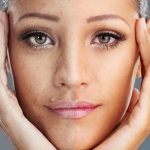What are the signs of old age?
Published:
Categories: CollagenAging is a natural process that all of us go through. As we get older, our bodies and minds go through many changes. While some signs of aging are concerning, many are just normal parts of the aging process. In this article, we’ll discuss the common, harmless signs of aging that people experience as they grow older. Understanding these normal changes can help you notice any abnormal warning signs that may require medical attention.
Contents:
As we age, changes happen both inside and outside our bodies. Some signs of aging start to appear around age 50, while others may not show up until our 70s or beyond. Knowing what physical and mental changes are normal can help older adults understand what to expect and separate normal aging from serious conditions. With a healthy lifestyle, you can slow aging and maintain your quality of life as you grow older.

Normal Physical Signs of Aging
Our bodies go through many physical changes as we get older. Here are some of the most common, harmless signs of aging.
Wrinkles and Age Spots
As we age, our skin becomes thinner, less elastic, and less able to retain moisture. This leads to wrinkles, creases, and age spots on exposed skin like the face, neck, hands, and forearms. Wrinkles and age spots are normal signs of aging. They may be more noticeable around age 65.
Loss of Bone Density
Starting around age 30, we begin to gradually lose bone density. This loss speeds up for women around menopause and can lead to osteoporosis. It's normal to lose some bone density with age, but significant loss can increase the risk of fractures. Getting enough calcium and vitamin D can help prevent excessive bone loss.
Changes in Heart and Blood Vessels
The heart and blood vessels naturally change with age. The tissue beneath the inner lining of the arteries may gradually thicken. Fat deposits may build up. Blood vessels and arteries become stiffer, forcing the heart to work harder to pump blood through them. These normal aging effects increase the risk for high blood pressure and heart disease. Staying active helps maintain heart health.
Loss of Muscle Mass
We naturally lose muscle mass and strength as we get older. This normal change is called sarcopenia. It tends to speed up around age 65 and can lead to feelings of weakness. Staying physically active with strength training exercises can help minimize muscle loss.
Vision Changes
Aging can cause gradual changes in vision. The lenses inside the eyes become stiffer and less able to focus. Pupils become smaller and less responsive to changes in light. Common aging effects like presbyopia and sensitivity to glare make reading and driving more difficult. Eye exams and corrective lenses can help compensate.
Hearing Loss
It's common to experience some degree of hearing loss as you get older. This is often due to changes in the inner ear or nerve pathways leading to the brain. Higher pitch sounds may become harder to hear. Getting your hearing tested can determine whether hearing aids would help.
Dental and Oral Changes
Our mouths naturally change as we age. Receding gums expose more tooth surface to potential decay. Tissue lining the mouth may become thinner and more easily damaged. Saliva production may decrease, causing a dry mouth. Brushing, flossing, regular dental cleanings, and proper oral hygiene can limit oral health issues.
Normal Mental Changes with Aging
Aging doesn't just affect our physical bodies. Our minds also go through gradual changes over the years. Here are some normal mental effects of aging:
Slower Information Processing
Our brain processes information less rapidly as we age. Thinking and recalling information may take longer. Completing tasks seems to require more effort. This is normal, but significant declines in mental sharpness could signal dementia. Challenging your mind can help retain cognitive skills.
Short-Term Memory Issues
It may be harder to recall recent events and information as you get older. You may be more prone to "senior moments." Occasional forgetfulness and difficulty retrieving memories are normal. Repeatedly forgetting important things may indicate a problem. Keeping mentally active can help.
Difficulty Focusing/Paying Attention
With age, you may find it takes more mental effort to stay focused on tasks. It's normal for your mind to occasionally wander. But consistent problems concentrating could indicate attention deficit disorder. Staying mentally engaged can sharpen focus.
Taking Longer to Learn New Skills
New learning typically takes longer as we age. Getting older adults to master new technical skills may require more repetition. Elders may need to review instructions. But taking a bit longer to learn is normal, not a sign of decline. Patience and practice can aid new learning.
Changes in Mood and Personality
Getting older may change your outlook on life in some ways. You may become less patient and more irritable. Some grow more anxious or depressed. But significant personality shifts could signal issues. Staying socially active and resilient usually maintains mental health.
Tip-of-the-Tongue Moments
Having a word on the tip of your tongue that you can't recall can be frustrating. This happens more often as we age. The medical term for this is lethologica. It's normal, not a serious sign of decline. Jogging your memory often brings the word to mind.
When Are Signs of Aging Abnormal?
While many age-related changes are normal, some can indicate more serious underlying medical issues. Contact your doctor promptly if you notice any of the following:
- Memory loss that disrupts daily activities
- Confusion, personality changes, and irritability that get worse over time
- Difficulty walking, loss of balance, increased falls or immobility
- Inability to bathe, dress, or do routine activities independently
- Skin changes like unusual bleeding, sores, or moles
- Difficulty swallowing food or unplanned weight loss
- New, persistent headaches or vision problems
- Hearing loss that impairs ability to communicate or isolates you
- Chest pain, ongoing cough, or shortness of breath with exertion
Seeking early treatment for abnormalities can help manage conditions and preserve your health as you age. Don't hesitate to discuss your concerns with your physician.
Healthy Aging Tips
While some effects of aging are inevitable, you're not powerless. Making simple healthy lifestyle choices can help you look and feel your best in your older years. Here are some tips:
- Exercise regularly - aim for 2.5 hours per week of moderate activity. This maintains muscle strength, mobility, and heart health.
- Eat a nutritious diet high in fruits, vegetables, fiber, and lean protein. Avoid saturated fats. Proper nutrition supports overall health.
- Get enough sleep - 7-8 hours per night is ideal. Adequate rest keeps your mind sharp and reduces stress.
- Stay socially engaged in activities and hobbies you enjoy. Social interaction helps ward off isolation and depression.
- Challenge your brain daily by learning new skills, doing puzzles, reading, or playing games. Mental stimulation preserves cognition.
- Manage stress through relaxation techniques, sufficient sleep, and talking to friends or a therapist. Unmanaged stress takes a toll.
- Get regular medical checkups and screenings to catch any issues early when they're most treatable.
Accepting and understanding how aging changes your body and mind can help you gracefully embrace getting older. Focus on maintaining health and quality of life. With a positive outlook and healthy choices, your later years can be an enriching time.
Frequently Asked Questions About Aging
Aging brings many changes to our bodies and minds. Here are answers to some common questions about the normal aging process:
Why does skin get wrinkled with age?
As we get older, our skin produces less collagen and elastin - fibers that keep skin firm and elastic. Skin also becomes thinner over time. These changes cause wrinkles, creases, and sagging skin.
Is memory loss a normal part of aging?
Mild memory lapses and difficulties retrieving memories can be a normal part of aging. Significant memory loss that disrupts daily activities may indicate dementia. See your doctor if memory issues concern you.
Why do people shrink as they get older?
Height loss is common with aging due to Compression of discs in the spine and changes in posture. People can lose 1-3 inches in height by age 80. Loss of muscle mass as we age also contributes to shrinking.
When should older adults get hearing aids?
If hearing loss interferes with daily communication and activities, get your hearing tested. Hearing aids are recommended when hearing aids can improve ability to communicate and engage. Don't wait until hearing loss is severe.
Is depression a normal consequence of aging?
Depression is not a normal result of aging. But factors like isolation, medical problems, and the death of loved ones can trigger late-life depression. Seek treatment if depression symptoms persist for two weeks or more.
What causes age-related bone loss?
Bones naturally lose density and weaken with age due to more bone resorption than formation. Declining estrogen also accelerates bone loss in older women. Getting enough calcium, vitamin D and exercise helps maintain bone strength.
When should I be concerned about forgetfulness?
Occasional lapses in memory are normal. But repeatedly forgetting important information, getting lost in familiar places, or difficulty completing routine tasks should prompt a medical evaluation for dementia.
Why do people need reading glasses as they age?
Reduced elasticity in the lens of the eye makes focusing on close objects hard for many older adults. Presbyopia causes blurry near vision corrected by magnifying lenses in reading glasses.
Resources used to write this article
Centers for Disease Control and Prevention. (2021). Healthy aging: Promoting well-being in older adults. https://www.cdc.gov/grand-rounds/pp/2017/20170919-senior-aging.html
National Institute on Aging. (2022). What is healthy aging? https://www.nia.nih.gov/health/what-healthy-aging
Harvard Health Publishing. (2022). 12 tips for healthy aging. https://www.health.harvard.edu/healthy-aging/12-tips-for-healthy-aging
American Academy of Ophthalmology. (2022). Age-related vision changes. https://www.aao.org/eye-health/tips-prevention/age-related-vision-changes
Workman, J. L. (2022). The aging process - changes to mind, body, and senses. Verywell Health. https://www.verywellhealth.com/the-aging-process-2224746
Mayo Clinic. (2022). Aging: What to expect. https://www.mayoclinic.org/healthy-lifestyle/healthy-aging/in-depth/aging/art-20046070
Cleveland Clinic. (2021). The brain & nervous system: Normal aging. https://my.clevelandclinic.org/health/articles/21192-the-brain--nervous-system-normal-aging
Johns Hopkins Medicine. (n.d.). Changes in the body with aging. https://www.hopkinsmedicine.org/health/conditions-and-diseases/changes-in-the-body-with-aging
Sign up to our newsletter and enjoy 10% off one order
YOU MIGHT ALSO LIKE
Post related products
-

-

-

Look Younger CIBD0073


















